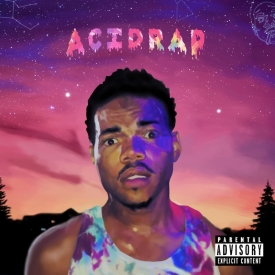When Acid Rap was released in the dying hours of April the hip hop Internet felt heavy with expectation. Chicago’s regional rap specialist Fake Shore Drive quickly crashed under the weight of demand, but within less than a day it was something bigger than that; the collective jaw of the music press was chattering eagerly over Chance on every corner of the web, plucking lofty comparisons out of the air and scrambling to inflated claims. For better or worse, this is how it works now; journalistic lead times have become a novelty in the mixtape era, so once the starting gun is fired – the race for opinions is underway.
Like with any big release, music blogs and Twitter were briefly transformed into a micro forum of premature dissection that felt akin to watching a Rap Genius entry being assembled in real time. It makes for addictive reading and offers occasional insight, but it’s mostly utterly exhausting. Part of me wants to shut off the internet and drown out the critical din, while the other part can’t help but soak up every grain of praise and criticism flung in Chance’s direction. Truth is it doesn’t matter all that much – not really – but for Chance it will be the difference between going on to something special and having his vibe killed.
Acid Rap – his second release – is born into this climate of consumption, but thankfully it’s mostly not a product of it. While last year’s promising but patchy debut was sketched out during a ten day high school suspension period, Acid Rap feels like a more considered ‘this is me’ statement. Chance’s excitable, high-pitched raps still carry the zip and zest of a young man excited to hear his voice on record, but they also come with a new sense of purpose. He attacks this release with so many different ideas that all jostle for space – from exuberant, loose-lipped verses to psych instrumentation and moments of patient, reflective poignancy – yet there is a defined identity which holds them together.
This identity essentially boils down to Chicago life and music, which is the beating heart behind nearly all which is brilliant about Acid Rap. Chance claimed in a recent interview with Hip Hop DX that the first record he ever owned was The College Dropout, and appropriately the tape’s opener ‘Good Ass Intro’ references Kanye in more ways than just its sample. Like The College Dropout, Chicago veteran Twista also appears for some characteristically rapid wordplay on ‘Cocoa Butter Kisses’, while references to the city’s footwork music give a vibrant edge to both lyrics ("Bang, Bang, Bang, Skeet, Skeet, Skeet, Skeet / She do that thing for three retweets") and occasionally fidgety, juke-ish drums. When Chicago outsiders do crop up they feel mostly surplus to requirements, as Childish Gambino often does, but even the usually excellent Action Bronson and Ab Soul sound oddly flat next to Vic Mensa and impressive newcomer Noname Gypsy.
Chicago is also the setting for Acid Rap‘s most memorable storytelling, found in the more routine hometown shoutouts of ‘Juice’, but also in a couple of moving laments for the 500+ homicides suffered by the city last year. "Down here it’s easier to find a gun than it is to find a fucking parking spot", he jokes gloomily in ‘Pusha Man”s downbeat second phase, before expressing dread at the thought of another summertime ravaged by loss: "I hate crowded beaches, I hate the sound of fireworks." Chance brings the grief closer to home on ‘Acid Rain’ in which he hears the demons of a dead friend screaming in an empty hallway, chilled by the realisation – "My big homie died young, just turned older than him."
Given these experiences it’s no surprise that Chance can seem like a rational head on young shoulders, which is especially moving as he repeatedly reminds us of his adolescence. ‘Cocoa Butter Kisses’, for instance, finds him high and craving the childhood comforts of cartoons and his mother’s love, dropping Visine into his eyes to avoid disappointing his grandma. While on ‘Good Ass Intro’ he toys with playground taunts and writes possibly the tape’s funniest quip in the process – "If you ever actually hit me, better watch out for my brother." Indeed, Chance’s reluctance to indulge in violent rap has inevitably seen him contrasted with the likes of Chicago’s Chief Keef and King Louie, but its perhaps more useful to consider the common cause of their art rather than the different forms it takes. Chance even throws a conscious biggup in Keef’s direction with the probable intention of deflecting this discourse, but otherwise he’s losing himself in jazzy acid swirls or on the lean which turns square to rhombus on ‘Smoke Again’.
For the good of his career, Chance will want to continue swerving the potholes of internet rap culture and carry on tripping to his own beat. Acid Rap is by no means without its kinks – ‘Favourite Song’ and ‘NaNa’ make for a definite lull to these ears – but the heady Chicago cocktail served up on the tape’s other 11 songs paints a splat of vivid colour over the city’s newspaper headlines. Even if the brightness is hallucinatory, sometimes it helps to pretend everything’s good.


